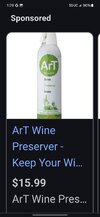It's oxygen that degraded the raws that's why it's needed to vacuum seal and put oxygen absorber in there?
Thing is that I have some oral raws that I want to cap and use them in the next 3 years or so. Should I vacum seal them and cap as needed or they won't degrade by sitting in a capsule in that time frame?
Thing is that I have some oral raws that I want to cap and use them in the next 3 years or so. Should I vacum seal them and cap as needed or they won't degrade by sitting in a capsule in that time frame?


